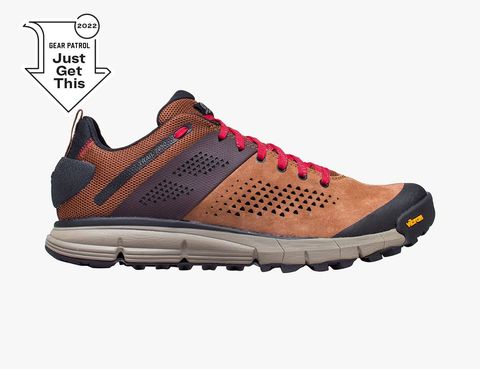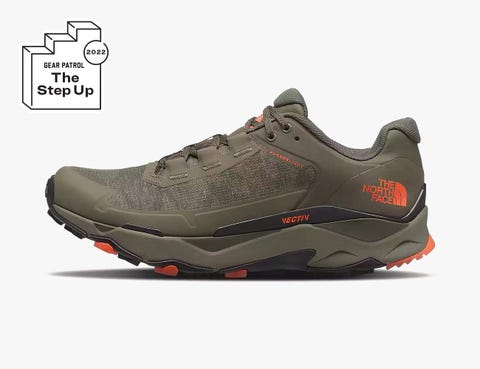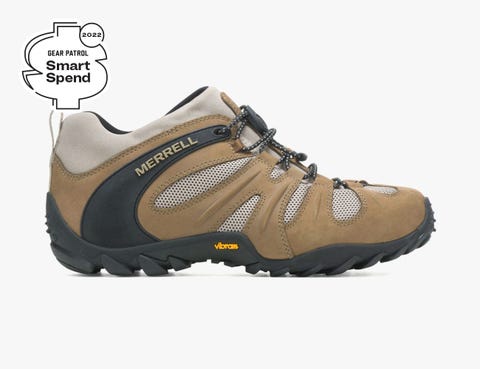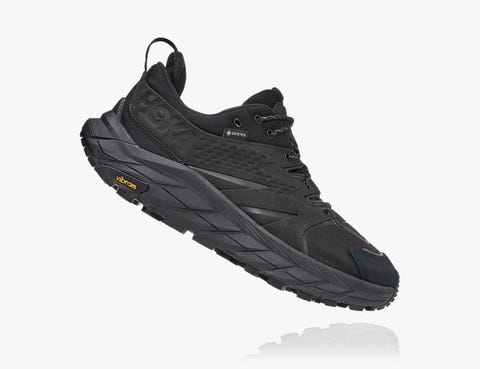Why should you buy hiking shoes instead of hiking boots? Because if you aren’t traveling over seriously rugged terrain or carrying a heavily loaded pack, you might not need the full-size version.
Hiking shoes are lighter and more nimble than boots, but they still come kitted out with features like Gore-Tex waterproofing, grippy rubber tread and supportive, durable uppers. As a bonus, many of them are sleek enough to pass as everyday footwear around town.
Benefits of a Hiking Shoe
The most obvious benefit of choosing a hiking shoe over a hiking boot is cutting weight — by losing the mid-height of a traditional boot, you’re shaving ounces off each pair,Oofos Outlet resulting in a decidedly lighter hiking experience. With a lower silhouette, you’re also getting more breathability and freedom of movement, but for anyone with sensitive ankles or past injuries, think twice before switching to a low-profile pair.
An additional benefit of opting for a hiking shoe is travel — since they’re less bulky, less heavy and still kitted out with the same waterproofing and durability as their full-sized counterparts, hiking shoes are easier to stuff into your favorite weekender, luggage or travel backpack.
This definitive guide provides information on the best hiking shoes you can buy. In it, we break down each model’s key features, such as support, material, weight and more.
Danner Trail 2650
Danner’s most iconic hiking boot is the Mountain Light, which, despite what its name might have you believe, is notably not lightweight (it is rugged as hell though). The Trail 2650, however, actually is light. Danner says that they’re 24 ounces a pair, the shoe is its lightest piece of hiking footwear yet. To get there, Danner built its upper with a combination of leather and mesh and used a Vibram outsole for traction.
The Trail 2650 certainly feels light on the feet, too. It fits much like a trail running shoe (the last that Danner used is based on them), but the construction includes a TPU shank and a heel counter, so they’re sturdy and supportive enough hiking long miles on dirt and clambering over boulders. They’re available with or without waterproofing (a waterproof liner can make hiking shoes hot and lead to sweating) and they’re comfortable enough to wear around town as an everyday shoe, too. For all these reasons, they’re the ideal hiking shoe for most people and uses — for more technical, specific hiking shoes, keep reading.
Weight: 12 ounces
Waterproofing: available with Gore-Tex
Upper: Leather, synthetic
Sole: Vibram 460
To revitalize its collection of trail running shoes, The North Face implemented some of the same tech found in high-performance road models. Those elements are also present in The Exploris, a hiking shoe fit for day hiking and even backpacking too.
Most notable among them is perhaps the Vectiv plate, which sits between your foot and the midsole and provides rigidity and stability (you can see it peeking out near the rear part of the shoe). But the feature we found more noticeable is the Exploris’s rockered sole, which, in a running shoe, would help transfer a marathoner efficiently from one stride to the next. Hey Dudes Shoes It works the same way here, and we’ve found the experience a welcome one — particularly when speeding up on flatter sections — in nearly 100 miles of testing in Vermont’s Green Mountains.
The rest of this shoe’s components are up to par, too; it has TNF’s proprietary breathable waterproofing, a grippy outsole and a very comfortable upper made of ripstop mesh that’s reinforced in the toe for stub protection.
Weight: 13 ounces
Waterproofing: Futurelight (The North Face’s proprietary waterproof/breathable membrane)
Upper: Cordura ripstop mesh (synthetic)
Sole: Surface Control rubber (The North Face proprietary)
Merrell Chameleon 8 Stretch
Merrell’s Chameleon hiking shoe has been a ranking member in its collection for years, but the brand recently modified it with this lightweight breathable option. It’s not waterproof, but that feature is honestly less important in hiking shoes (water can easily enter from the cuff anyway) than in taller boots. It’s a fair trade for extra breathability and makes it a good shoe for warm weather and dry conditions.
The Chameleon 8 Stretch uses a speed-lacing system and an elastic bungee-like cord that makes getting them on and cinched very quick — no hooks to thread here. Once tightened, the plastic adjustment tab is fairly difficult and non-intuitive to loosen again, but these shoes can be put on and taken off without loosening the laces.
It’s another tongueless hiking shoe, which means it’s super comfortable, perhaps even the most comfortable on this list (at least straight out of the box). The cuff is soft and stretchy and provides a close-to-ankle fit that’ll keep larger-sized debris from getting down inside the shoe. This trait is a huge plus for a hiking shoe because, without a tall cuff, gravel and dirt can easily sneak in and make trouble for your feet.
Weight: 15 ounces
Waterproofing: available with waterproofing
Upper: Nubuck leather and synthetic mesh
Sole: Vibram XS Trek Evo
If you’re familiar with Hoka’s running shoes, then you won’t be surprised by the thick wedge of foam that supports the Anacapa Low. But Hoka runners will quickly learn that the Anacapa Low’s sole is less bounce and more support (and durability), as a hiking shoe should be.
Alongside the out-of-the-box comfort Hokas are prized for, the Anacapa Low also boasts a few sustainable features worth noting: there’s recycled polyester in the collar, the leather used in the upper is certified by the Leather Working Group and the sockliner is 50-percent soy-based.
The company actually used its mid-sized Anacapa as a template, resulting in a reinvented model that combines the feel of a sneaker with the durability of a hiking boot, which makes it easy to wear them running trails, or running errands.
Weight: 14 ounces
Waterproofing: Gore-Tex
Upper: Leather Working Group Gold-rated waterproof nubuck leather
Sole: Vibram Megagrip
Vasque Breeze LT Low NTX
We have long been fans of Vasque’s Breeze line, so much so that the Breeze AT Mid GTX is a staple of our best hiking boots guide. True to the name, Breeze footwear tends to be incredibly comfortable right out of the box but surprisingly durable, too. So we can’t help but be stoked about this new, more earth-friendly shoe, which features a breathable recycled mesh and suede upper and Nature-Tex waterproof tech made with 50 percent recycled materials. Like everything Breeze, it also boasts a comfy, anatomical footbed, a cushy, propellant midsole and grippy Vibram outsole to ensure you stay on your feet.
Weight: 12.5 ounces
Waterproofing: Nature Tex
Upper: recycled mesh and suede
Sole: Vibram Ground Control LiteBase with Megagrip Compound
One of Salomon’s newest entries in the hiking category splits the difference between a boot and a shoe with its mid-height collar — and strikes an equal balance between looks and performance. “This shoe remains stylish without sacrificing comfort or function,” raves our tester. “My one gripe would be that my shoelaces constantly came undone,Thorogood Boots as I am not a double-knotter.” Nonetheless, she was impressed with the light weight, support, grip and ability to tackle an eight-mile hike with no break-in. Perhaps most notable, and the reason the Predict wins this category: even with the mid-cuff and Gore-Tex lining, the shoes remained both breathable and relatively dry in hot Southern California weather.
Weight: 13.3 ounces
Waterproofing: Gore-Tex
Upper: textile/synthetic
Sole: Contagrip rubber
Tecnica Plasma S GTX Hiking Shoes – Men’s
A year after the release of the full-size Forge, Tecnica brought its custom heat molding to the hiking shoe category with the low-cut Plasma. The process is entirely the same: there are two rounds of heat molding, one for the insole and a second for the upper. It uses the same machine, which is available at retailers where the shoes are sold, and takes less than 30 minutes. As with the Forge, the result is a hiking shoe that fits immediately — no break-in period.
The Plasma is on the more rugged end of the hiking shoe spectrum thanks to its stiff rubber outsole, but it’s still more flexible than many approach shoes and suitable to both long and short hikes, though maybe not walking around in a city all day. At first, our tester worried that the heat treatment wouldn’t be as effective in a shoe because there’s less material to mold, and wondered if it would still create that tight, ski boot-reminiscent fit. These feelings were alleviated throughout an entire autumn hiking in the Northeast on trails of all types. He claims to never have experienced blisters despite being prone to them and remarked that his feet stayed comfortable on the longest days.
The one downside is that you have to have access to a retailer with Tecnica’s molding machine to take full advantage of these hiking shoes. Many REIs stock them, but you can see a full list here. Oh and for a bit more size and color variety (at the original price of $180), shop here.
Weight: 19.3 ounces
Waterproofing: Available in waterproof and non-waterproof versions
Upper: Synthetic
Sole: Vibram Plasma with Megagrip compound
Salewa occupies the technical end of the mountain footwear spectrum. Many of its hiking shoes take rugged inspiration from and feel more like approach shoes, but the Dropline aims for speed first. It’s a more technical mountain shoe that has a close fit and uses a grippy Pomoca rubber outsole that has a lug pattern suitable for regular hiking. As something of a mix between an approach shoe and a trail running shoe, it’s also slightly lighter and more flexible, which makes it ideal for hikers who like to move fast over technical terrain. We’ve found it handles mud and snow just fine in addition to dry ground, even on steep descents.
Weight: 12.9 ounces
Waterproofing: available with Gore-Tex
Upper: synthetic mesh
Sole: Pomoca rubber
La Sportiva TX4 Approach Shoe
Technically, La Sportiva’s TX4 is an approach shoe. Approach shoes, lightweight mountain footwear that rock climbers use to reach the base of a wall, typically feature a sticky rubber outsole to provide excellent grip, and the TX4 is no exception there. Its lug pattern and leather upper make it a great choice for full-time trail use, too, even if you have no intention of roping up and going vertical. Our tester praises its construction as “ideal for wet, muddy and loose rocky conditions,” which other approach shoes might not handle as well. Its low profile makes it ideal for use around town if you embrace the outdoorsy look. (And, if you do climb, this might be your new do-everything shoe.)
Weight: 13 ounces
Waterproofing: no
Upper: leather
Sole: Vibram Megagrip Traverse with Impact Brake System
Arc’teryx isn’t as well-known for its footwear as it is for its technical apparel, but the Konseal FL lives up to the brand’s high standards for quality. And like its clothing, the shoe packs lots of functionality into a clean and minimalist profile. Colors are coordinated and subtle, and the different materials that are present blend into one another almost invisibly; even the laces are fully integrated into the design, using loops of webbing instead of eyelets.The lacing system might be the best part about the Konseal FL. It extends all the way down to the toe so that the fit can be adjusted and fine-tuned as much as possible, which in turn contributes to a better overall hiking experience, especially in technical terrain. The integrated system adjusts smoothly, too, so there’s less tugging and pulling to get the comfortable fit you need.
The Konseal FL is minimalist in appearance but also somewhat in use. As an approach shoe, it provides plenty of protection with toe and heel caps and a raised midsole sidewall, which is ideal for use in rocky terrain. The shoes don’t have as much cushioning as others on this list though, so fast-hikers and fans of lightweight minimalism will find the most use here.
Weight: 10.6 ounces
Waterproofing: No
Upper: Synthetic
Sole: Vibram Megagrip
Unico Hiker
The Unico comes from the birthplace of outdoor footwear (the Alps), and it’s a shoe designed to be a crossover between a hiking boot and a trail running shoe. Regardless of what it aims to be, it is an impressive piece of footwear, with an upper made of one single piece of Kevlar fabric. That durable exterior is lined with a sock-like wool liner that’s connected at the bottom of the shoe only so that it can “float” inside and better export moisture. The footbed is made of a blend of leather and coconut fibers.
The Unico is among the burliest hiking shoes to make our list, and that’s thanks to the materials that Naglev so carefully selected in its construction. The rubber outsole is stiff, and the Kevlar is borderline abrasive, but the Unico mitigates these factors with its interior wool liner and leather insole, both of which make the shoe far more comfortable than it looks. Unlike some of the lighter hiking shoes, it does require some break-in — if you’re looking for a more forgiving hiking shoe, check out some of our other picks — but the result is worth the process.
Weight: N/A
Waterproofing: Yes
Upper: Kevlar, TPU, wool liner
Sole: Natural rubber
Merrell used its best-selling Moab as a base for a lighter, more nimble model called the Moab Speed that’s something of a hybrid between a trail running shoe and a hiking shoe. Despite its pared-down design, the Speed carries through one of the Moab’s most beloved characteristics: out-of-the-box comfort. Our tester put in roughly 90 miles on a pair and found that the roomy toebox was ideal for longer hikes on relatively flatter terrain but second to the plush cushioning that makes these a truly comfortable set of hiking shoes. He noted that the lug pattern isn’t extreme and doesn’t provide significant braking — while we recommend them as a solid all-rounder, consider another pair if most of your hikes involve scrambling and steep terrain.
Weight: 11.5 ounces
Waterproofing: available with Gore-Tex
Upper: mesh and TPU
Sole: Vibram Traction Lug












